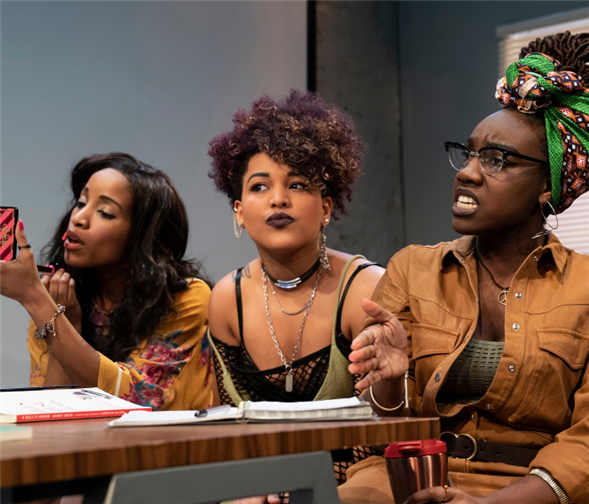Translate Page

Kristiana Rae Colón's confrontational drama asks tough questions about our nationwide epidemic
---
Kristiana Rae Colón feels conflicted that her decade-old play exploring the connection between gun and sexual violence, good friday, continues to be produced. After touring college campuses throughout the country, it's finally having its New York premiere at the Flea Theater. However, the playwright wishes it were no longer relevant. "I am glad that there is an appetite for my work," she says, "but it's also really sad that, 10 years later, it's such a hot topic still."
Originally titled The Darkest Pit when it debuted in 2009, the play has undergone a few rewrites since then but its bones remain the same. A group of female college students are in class when gunshots ring out. As they huddle in fear wondering how to survive, they debate whether the best response to violence is to pick up weapons themselves.
"One of my theatrical projects is to complicate the idea of the villain, and trying to get the audience to see themselves in people who do heinous things," Colón says. "I think we are collectively complicit in the violence that we experience in society."
{Image1}
Colón's initial inspirations for the play were the 2007 Virginia Tech shooting and the staggering rate of sexual assault experienced by female undergrads. Considering these problems continue to plague our society, good friday's central question of whether peaceful resistance has lost its usefulness feels terrifyingly urgent. As one character puts it: "Men only listen to one language: the tongue of bullets and guns and blood."
The notion of not-gonna-take-it-anymore, gun-toting women may sound like a Tarantino action flick, but Colón knows real life is more complicated. What drives people to violence is a complex issue and -- if the circumstances are right -- almost anyone can succumb.
"That's the thing that I'm interested in, because I think we often find ways to distance ourselves from those dark impulses," Colón says. "I think it's really useful for people to be confronted with what would make you make this choice? And then the question that follows is, what can we do or what do we need to change to avoid these kinds of outcomes?"
Thanks to a shocking reveal late in the play, Colón realizes audiences may leave feeling raw and troubled, and the Flea is committed to providing support. There are staff members in the lobby to talk to after the performance, and everyone is encouraged to take a deep breath together at curtain call. Ultimately, Colón hopes the show will inspire theatregoers to think about their part in the cycle of violence.
"I think men need to be having difficult conversations with each other about gendered violence," she says. "I think #MeToo and #TimesUp have created the space for men to begin having these conversations, and that to me is a viable way forward."
For women, Colón has a different wish. On the one hand good friday "means to provoke an investigation into our own complicity in internalizing patriarchy," but at the same time, she also hopes for "some revelation around healing. I think each character seeks a way to find strength to survive and to heal. I hope that the provocation of the play for women is to find those spaces for themselves."
---
Follow Diep Tran at @DiepThought. Follow TDF at @TDFNYC.
Top image: Ure Egbuho, Dolores Avery and Caturah Brown in good friday. Photos by Joan Marcus.
TDF MEMBERS: Browse our discount tickets to theatre, dance and concerts.